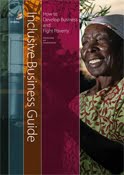Christina Gradl and Claudia Knobloch are the authors of the “Inclusive Business Guide: How to Develop Business and Fight Poverty”, which has recently been released by the independent institute endeva. They define inclusive business as one that “integrates people in living poverty into the value chain as consumers and producers, thus making a positive contribution to the development of company, the local population and the environment (Grad and Knobloch 2010, p. 10). They use the term "people living in poverty" to emphasize that it is the living environment of those affected that leads to poverty. From this perspective poverty in developing countries is largely seen as a structural problem rather than an individual problem.As consumers, people living in poverty represent a large and growing market. it is estimated by the International Finance Corporation and the World Resource Institute (2007) that 4 billion people in the world live on less than US$ 3000 per annum (measured in terms of local purchasing power). Altogether they spend approximately US$ 5 trillion (!) a year, mostly on basic needs like food, housing, mobility, and health.As suppliers, people living in poverty provide agricultural raw materials for end products such food, textiles, and cosmetics. In our most recent posts we discussed two examples from Latin America falling into this category: Kuna and Natura Ekos...read more
Skip to content
Menu
Google Custom Search
Wir verwenden Google für unsere Suche. Mit Klick auf „Suche aktivieren“ aktivieren Sie das Suchfeld und akzeptieren die Nutzungsbedingungen.
